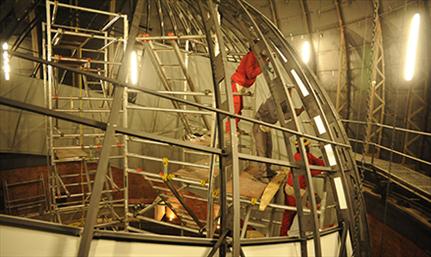Latest News Archive
Please select Category, Year, and then Month to display items
12 January 2024
|
Story Nonsindiswe Qwabe
|
Photo Sonia Small
 Since joining the UFS in 2008, Dr Grey Magaiza has worked extensively on approaches that can foster the socio-economic transformation of societies.
Since joining the UFS in 2008, Dr Grey Magaiza has worked extensively on approaches that can foster the socio-economic transformation of societies.
“The future should be one where communities can decide on their development agenda and futures. That’s the most important for me.” Dr Grey Magaiza, Deputy Director of the Centre for Gender and Africa Studies (CGAS) and Head of the Community Development programme on the Qwaqwa Campus, is passionate about capacitating communities to be agents of change and advancement. His vision for the future emphasises the empowerment of communities to take charge of their development by actively participating in decision making and the implementation of development projects that can improve their lives.
Since joining the UFS in 2008, Dr Magaiza has worked extensively on approaches that can foster the socio-economic transformation of societies. Over the years, he has crafted his research speciality into one that he is most proud of – being an interdisciplinary scientist immersed in the development of communities.
“I’m in a fortunate position of researching what I like. I say ‘fortunate’, because I’ve taken the time to understand what I’m passionate about, which is the overall field of rural livelihoods and livelihood futures – in short, community development. My research starts from an engaged university, understanding the elements that a university must use to enhance transformation and relevance to its immediate community in terms of development.”
One of the ways he has done this is by looking at social entrepreneurship as a development approach for young people in a rural setting. Through workshops with non-profit and civic organisations in Qwaqwa, Dr Magaiza has been helping these organisations to map out their needs and actively meet them through the involvement and support of external role players.
“We understand that communities are part of the national development agenda, but even that national agenda respects community knowledge and intentions and allows communities to shape their identity. A critical enabler of this is community organising. You bring back the capacity in communities to have dialogues on issues affecting them as spaces for engagement, knowledge exchange, and for people to just talk about their way forward.”
By enabling communities to define their development agenda, they can address their specific needs, challenges, and aspirations, he said. “When I look at livelihood futures, it’s quite an exciting aspect of my work – it’s like looking into a fortune tellers’ globe, because you’re not deciding for communities what they should do, but the communities themselves take those decisions.”
Interior dome of Naval Hill planetarium reaches completion
2013-09-04
|
 |
Work on the inside of the dome
Photo: Reinier Brönn
01 September 2013 |
The interior perforated aluminium planetarium dome has been installed by an American expert from Astro-Tec, the American company that customised the dome for the planetarium on Naval Hill. The planetarium, the first digital planetarium in sub-Saharan Africa, is scheduled to open in November 2013. The UFS manages the project.
The dome arrived in parts by ship from the USA in June 2013. These parts consisted of a number of long curved ‘ribs’ and numerous perforated panels. The panels were attached in sections to the ribs to form a smooth concave shell, creating the surface for the projection system.
The next step will be the installation of the projection system itself.
The 86-year old Lamont-Hussey Observatory on Naval Hill, also known as the Sterrewag Theatre, is home to the planetarium. The planetarium is the first component of a proposed Centre for Earth and Space. This will be a multi-purpose facility to promote science communication and preservation, and the arts.
This project is a long-term partnership between three main organisations, each bringing essential components to the project: the Mangaung Metro Municipality (MMM) as the land-owner, the Free State Department of Economic Development, Tourism and Environmental Affairs (DETEA) and the UFS, which developed the concept for the planetarium project and will be responsible for its operation and further fundraising endeavours.
The National Department of Science and Technology also joined this venture subsequent to providing substantial funding to the UFS in order to purchase the projection system for the planetarium.